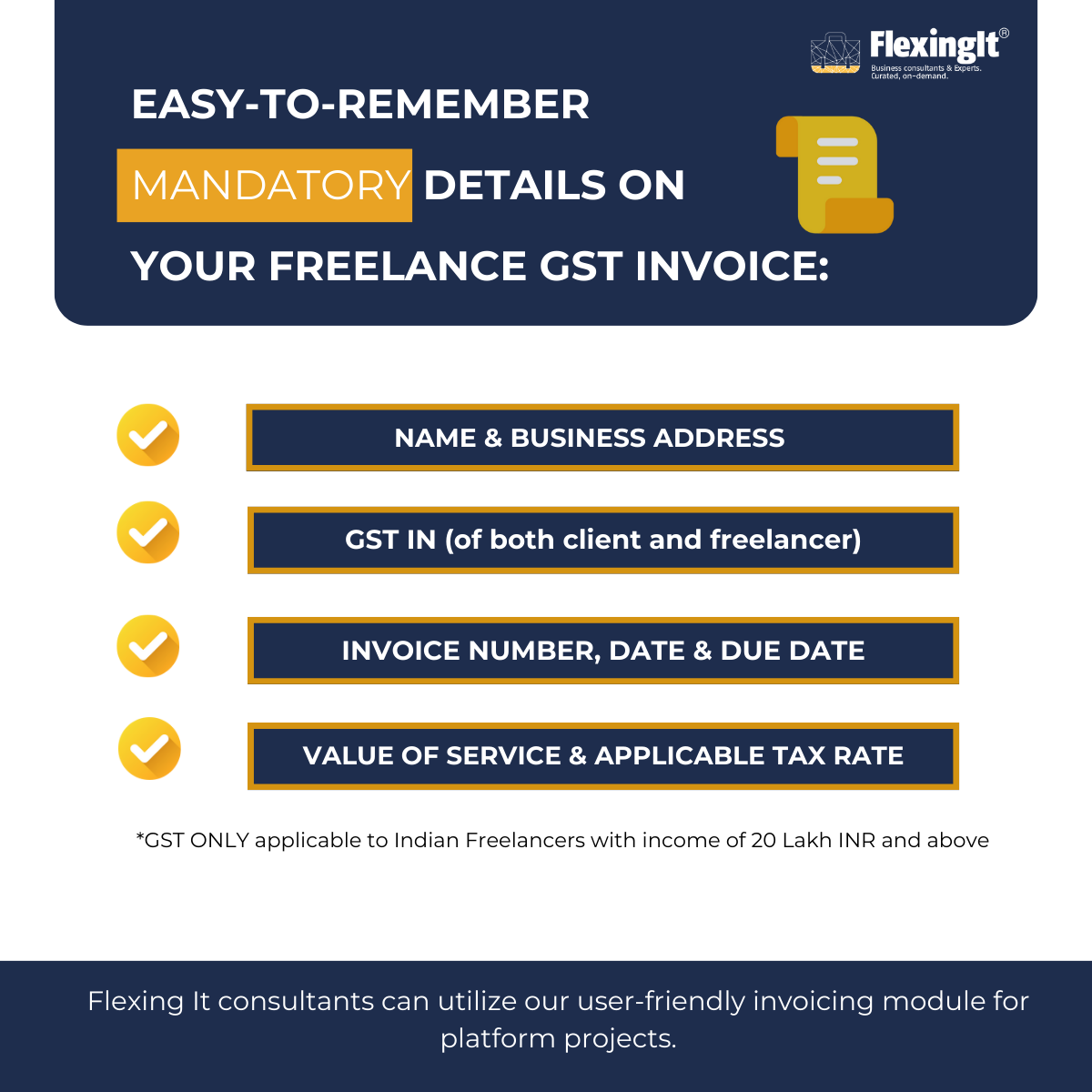Freelancer Focus
The Ultimate GST Guide for Freelancers: Everything You Need to Know in 2024
Written by: Flexing It
21/06/2024
5 minutes read
![eye]() 306
306
![share]() 0shares
0shares
Understanding Goods and Services Tax (GST) can feel like a maze, especially for freelancers. But don't be intimidated; understanding the basics is more manageable and can benefit your freelancer journey.
Our guide for the year 2024 will walk you through core concepts, help you streamline your processes, and avoid common mistakes.
Let's dive in and make your freelance journey smoother and more financially savvy!
Understanding GST Applicability
GST applies to your freelance earnings only if your annual billing exceeds ₹20 lakhs.
For instance, if your turnover is ₹24 lakhs in FY 2023-24, GST applies to excess ₹4 lakhs.
You must register for GST within 30 days of surpassing the ₹20 lakh threshold.
It's important to note that GST filing becomes mandatory from the second year onwards, even if your turnover is below ₹20 lakhs. So, if your turnover is ₹18 lakhs in the second year, GST will be applied to the entire amount.
Documents required for GST registration:
- Recent passport-size photograph
- Copy of PAN and Aadhaar card
- Latest bank account statement and cancelled cheque
- Proof of identity and address
- Digital signature certificate
- Copies of utility bills (e.g., electricity, telephone)
- Copy of lease/rental agreement for office premises, along with a No Objection Certificate (NOC) from the landlord/property owner/lessor confirming permission for business use.
Streamlining GST Filing
To save time and minimise errors in your GST filing process, consider these tips:
- Analyse Input Tax Credit (ITC) Carefully:
Input Tax Credit (ITC) is the GST a registered business (freelancer) pays on its purchases of goods and services. These purchases are essential to grow and develop the business, e.g. a laptop. Thoroughly review your ITC claims to reduce the risk of receiving queries from tax authorities.
Many ERPs make your filing easier. They offer direct linking with the GST portal, streamlining the process and helping you avoid mistakes.
Common GST Filing Mistakes
Freelancers often make several common mistakes when it comes to GST filings:
- Ignoring Input Tax Credits (ITC): Failing to analyse and claim ITC properly can lead to financial loss for freelancers in the future. Be cautious during every claim filing. For example, you can claim ITC on a business laptop purchase if it's used for business purposes not for personal use/gifts.
- Mixing Personal and Business Expenses: Keep separate records for personal and business expenses, otherwise, it may create complications with GST regulators.
- Incomplete Information from Vendors: Ensure you receive accurate information to avoid filing errors.
Addressing Common GST Concerns
Freelancers often face several GST-related concerns:
- Monitoring Turnover: Regularly monitor your turnover to ensure accuracy and maintain proper bookkeeping.
- Timely Invoicing and Submission: Raise invoices promptly and submit them to your CA or consultant before the 10th of each month to ensure timely return filing. Be aware of the specific timelines for filing GST returns. Check the calendar here
- No. of Returns to be Filed: You need to file two GST returns monthly, totalling 24 returns annually, plus one annual return, making it 25 returns a year.
- Tracking the GST Threshold: Keep track of your turnover from the start of operations to avoid compliance issues.
- Issuing GST-Compliant Invoices: Proper GST-compliant invoices are crucial to avoid penalties. Specialised invoicing modules can assist in this process. Include the following shared below:

GST for Interstate Services
If you provide your freelance services to clients in other states, you must file Integrated GST (IGST), regardless of your income threshold. More info
Export Benefits for Freelancers
Freelancers providing services to overseas clients and receiving payment in foreign currency are exempt from charging GST. For example, a freelance writer with clients in the US, UK, and Australia, whose total income converts to ₹50 lakhs, would have a 0% GST liability. Do check for tax treaties with the client’s country and it is advisable to obtain a Letter of Undertaking (LUT) from the government to ensure full tax compliance.
By understanding these essential aspects, you can grasp the complexities of GST, ensuring compliance and optimising your tax position in 2024.
All the best!








 `
`  306
306
 0shares
0shares






